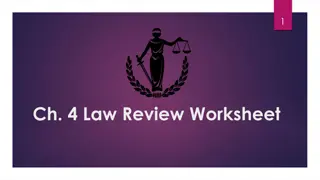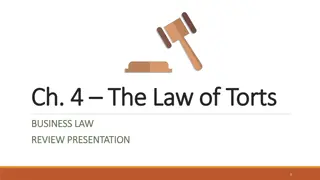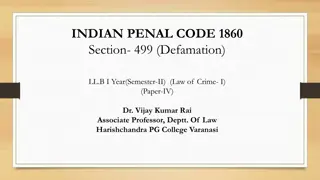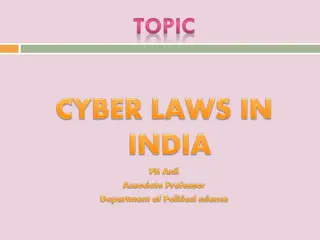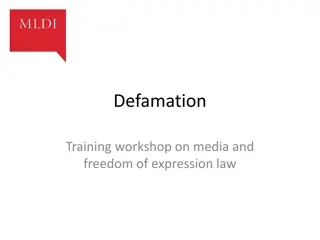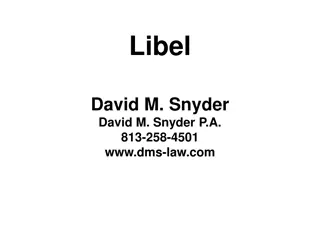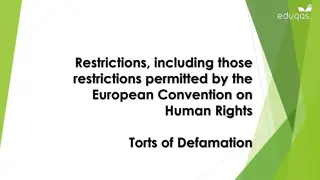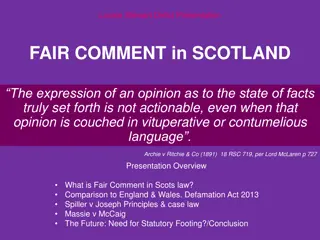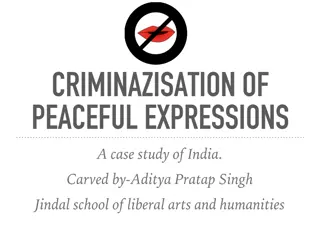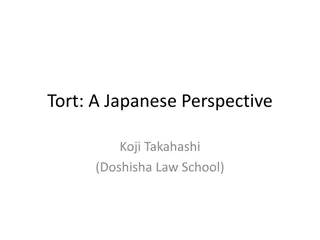Basic Legal Concepts Review
This content covers essential legal terminology such as crime, tort, intentional vs. unintentional torts, defamation, libel, slander, and elements of negligence in an easy-to-understand format. It provides definitions and explanations regarding fundamental legal principles that are crucial for anyon
2 views • 22 slides
The Basics of Torts in Business Law
Explore the fundamental concepts of torts in business law through an overview of various types of wrongful acts, such as interference with enjoyment, defamation, negligence, injunctions, strict liability, intentional torts, and trespass. Learn about the responsibilities and liabilities associated wi
1 views • 41 slides
Defamation Laws in Indian Penal Code 1860 Section 499
Indian Penal Code Section 499 defines defamation as making or publishing any imputation concerning a person intending harm or knowing it will harm their reputation. The section includes explanations regarding imputations towards deceased individuals, companies, and ironic expressions. To constitute
1 views • 10 slides
Cyber Laws in India
Cyber law in India encompasses the regulations governing cyber crimes, including theft, fraud, defamation, and more under the Indian Penal Code. The Information Technology Act of 2000 addresses modern crimes like cyber terrorism and credit card frauds. The necessity for cyber laws in India arises fr
0 views • 13 slides
Defamation Laws: Media, Freedom of Expression, and Reputation
Exploring the intricacies of defamation laws, this content delves into the concepts of libel, slander, and reputation protection under various international treaties. It discusses the rights of individuals, public figures, and groups to pursue legal action for damage to reputation, as well as the co
4 views • 14 slides
Jordan Penal Code Overview: Punishments for Various Offenses
Jordan's penal code details punishments for different offenses such as murder, assault, intentional harm, negligence causing death, defamation, and document tampering. Penalties include imprisonment with hard labor ranging from five years to fifteen years, and fines up to JD50. Specific articles out
0 views • 8 slides
Making Better Decisions Adviser Forum - Scenario #1 Decision Making Dilemma
During the final night of NOAC, a lodge adviser faces a challenging situation involving a prank orchestrated by the lodge chief and others that has deeply affected a 13-year-old Scout. The incident escalates when inappropriate photos are shared on social media, leading to a difficult decision-making
0 views • 27 slides
Libel Laws in Florida
Explore the definition of libel, how it pertains to publication of false statements, and the importance of truth as a defense against defamation. Learn about Florida jury instructions, the impact of literally true statements, and the complexities of proving the truth in a legal setting.
0 views • 20 slides
Social Media Risks and School Safety
Social media platforms like Facebook, Twitter, and Instagram pose risks such as cyberbullying, privacy breaches, and defamation issues for students. Information shared online can be used by bullies and predators, leading to potential harm and consequences like school discipline or arrest. Future imp
0 views • 34 slides
Defamation Law and Its Implications
Explore the intricacies of defamation law, including the requirements for proving a claim, available defenses, procedures for legal action, historical context, and comparisons between different Acts governing defamation. Learn about cases, elements of defamatory statements, and protections under the
0 views • 43 slides
Fair Comment Defense in Scottish Law
Fair comment is a common law defense in Scots law that facilitates freedom of speech by allowing opinions on matters of public interest. Compared to English law, Scotland has different approaches to defamation, with the Defamation Act 2013 mostly applying to England and Wales. The defense of fair co
0 views • 7 slides
Criminazisation of Peaceful Expressions: A Case Study of India
Indian governments use laws like sedition and defamation to stifle dissent, despite PM Modi's call for free speech. The sedition law, a colonial-era relic, is used against activists and critics, with vague language allowing misuse. Famous cases, including the arrest of Kanhaiya Kumar, highlight the
0 views • 13 slides
Japanese Tort Law: Choice of Law Rules and Double-Actionability
Japanese tort law follows specific choice of law rules, determining the applicable law based on factors such as the place of injury, product liability, and defamation. The double-actionability rule ensures that the harmful act is also unlawful under Japanese law and that remedies are available. This
0 views • 14 slides
Policy Advisory Committee Policy Advisory Committee
Addressing issues related to cybersquatting, defamation, and domain name registration, this summary outlines key points from the latest Policy Advisory Committee meeting. Topics covered include working group updates, concerns, workstreams, and discussions on Alternative Dispute Resolution processes.
0 views • 10 slides
